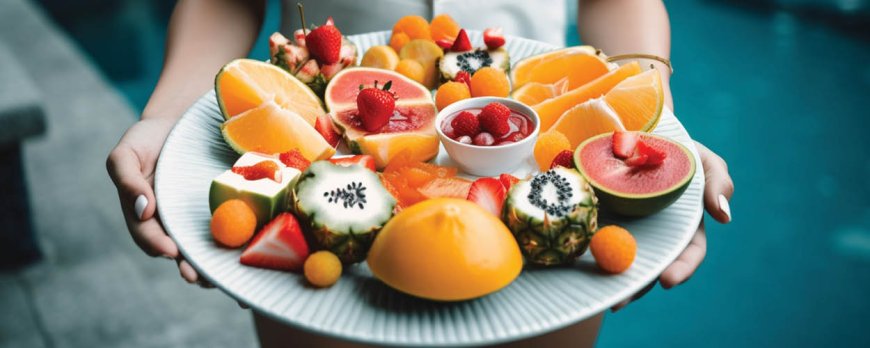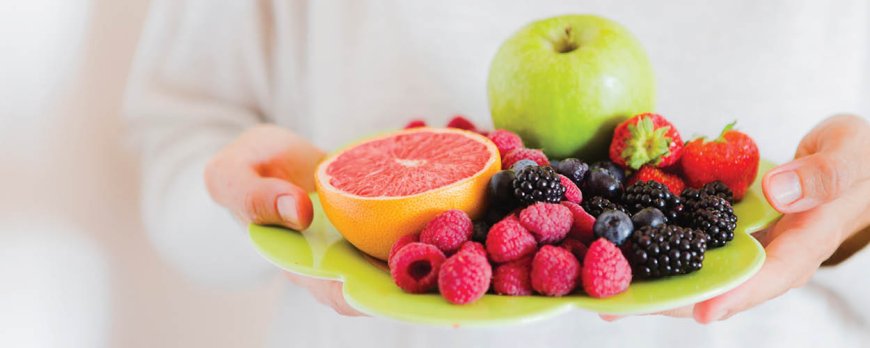What fruit has the most protein?
Curious to discover what fruit has the most protein? Tap into our rich guide exploring healthy and protein-packed fruits for your balanced diet.

What Fruit Has the Most Protein?
Are you wondering which fruit packs the most protein punch? Look no further as we dive into the world of protein-rich fruits and uncover the top contenders.
Key Takeaways:
- Fruits are not typically high in protein, but there are some exceptions.
- Guava, passion fruit, and avocado are among the fruits with the highest protein content.
- Other protein-rich fruits include jackfruit, pomegranates, and apricots.
- These fruits can be enjoyed in various ways, such as in smoothies, salads, or eaten plain.
- While fruits may not be the ultimate high-protein food, they are a healthy and effortless snack to add to your diet.

Protein Content in Fruits: Explained
While fruits are not typically associated with high protein levels, there are a few exceptional fruits that offer a surprising dose of this essential nutrient. These fruits can be a great addition to a balanced diet, providing not only vitamins and minerals but also a protein boost. Let's explore the protein-rich fruit options:
- Guava - With 2.6g of protein per 100g, guava ranks high among protein-rich fruits. This tropical fruit is not only a delicious snack but also a nutritious choice.
- Passion Fruit (Granadilla) - Known for its tangy and tropical flavor, passion fruit contains approximately 2.2g of protein per 100g, making it another great option.
- Avocado - Creamy and versatile, avocados provide about 2g of protein per 100g, along with healthy fats and various other nutrients.
- Jackfruit - This unique fruit stands out with its meaty texture and packs around 1.7g of protein per 100g, making it an interesting choice for both vegetarians and omnivores.
- Pomegranates - Known for their antioxidant properties, pomegranates also offer a surprising 1.7g of protein per 100g, adding even more value to their already impressive nutritional profile.
Other fruits that provide notable amounts of protein include apricots, blackberries, raspberries, nectarines, kiwi fruit, cherries, oranges, peaches, cantaloupe melons, and grapes, ranging from 1.4g to 0.9g of protein per 100g. These fruits can be enjoyed in various ways, such as in smoothies, salads, or eaten plain, offering a healthy and effortless snack option.
While these protein-rich fruits may not replace other significant protein sources in your diet, they make for a tasty and nutritious addition. So, next time you're craving a refreshing snack, consider reaching for a protein-packed fruit that will not only satisfy your taste buds but also contribute to your overall well-being.
Guava: A Protein Powerhouse
When it comes to protein-rich fruits, guava takes the crown, packing an impressive amount of protein per serving. With approximately 2.6 grams of protein per 100 grams, guava stands out among other fruits for its protein content. But it doesn't just stop there - guava is also rich in vitamins A and C, fiber, and antioxidants.
This tropical fruit can be enjoyed in various ways. You can eat it fresh, slice it into salads, blend it into smoothies, or even use it as a topping for yogurt or granola. The sweet and tangy flavor of guava adds a delightful twist to any dish.
Other Protein-Rich Fruits
- Passion Fruit (Granadilla) - 2.2g per 100g
- Avocado - 2g per 100g
- Jackfruit - 1.7g per 100g
- Pomegranates - 1.7g per 100g
- Apricots - 1.4g per 100g
These fruits not only provide a good dose of protein but also offer a range of other essential nutrients. Incorporating them into your diet can help support a balanced and healthy lifestyle. Whether you're looking to boost your protein intake or simply enjoy a delicious snack, these fruits are a great choice.

Passion Fruit: A Tropical Protein Boost
Get ready to indulge in the delectable flavor of passion fruit while reaping its protein-packed benefits. This tropical fruit may be small in size, but it packs a punch when it comes to protein content. Passion fruit contains approximately 2.2g of protein per 100g, making it one of the top protein-rich fruits.
Not only is passion fruit a great source of protein, but it is also rich in essential vitamins and minerals. It is high in vitamin C, vitamin A, and dietary fiber. The tangy and sweet flavor of passion fruit adds a tropical twist to any dish, making it a versatile ingredient in both sweet and savory recipes.
How to Enjoy Passion Fruit
- Add passion fruit pulp to smoothies for an extra burst of flavor and protein.
- Sprinkle passion fruit seeds over salads or yogurt for a crunchy and nutritious topping.
- Create a refreshing passion fruit sorbet or the classic Brazilian passion fruit mousse.
- Use passion fruit as a marinade for meats or a sauce for fish dishes.
With its unique flavor and protein-packed goodness, passion fruit is a must-try fruit for those looking to add more protein to their diet. So go ahead, indulge in the tropical taste of passion fruit and enjoy the benefits it brings.
Avocado: Creamy and Protein-Rich
Avocados aren't just delicious and versatile; they also offer a notable amount of protein to satisfy your dietary needs. With 2 grams of protein per 100 grams, avocados are a great choice for those looking to increase their protein intake while enjoying a creamy and nutritious fruit.
Known for their rich and smooth texture, avocados can be enjoyed in a variety of ways. Add sliced avocados to your salads for a protein-packed boost, or mash them up to create a creamy spread for sandwiches and wraps. You can even blend avocados into smoothies for a nutritious and filling snack.
Ways to Enjoy Avocados:
- Spread avocado on toast and top with your favorite toppings for a satisfying and protein-rich breakfast.
- Add avocado slices to your favorite salads for a creamy and nutritious addition.
- Mix mashed avocado with lime juice and spices to create a delicious homemade guacamole.
- Blend avocados into smoothies for a creamy texture and added protein.
While avocados may not be the highest protein fruit on the list, they are a great addition to a balanced diet and offer many other health benefits, such as being a good source of healthy fats and fiber. So go ahead and indulge in this creamy fruit for a tasty and protein-packed snack!

Jackfruit: A Surprising Source of Protein
Jackfruit is not only a delicious tropical fruit; it also surprises with its protein content, making it a perfect addition to vegetarian and vegan diets. With 1.7g of protein per 100g, jackfruit stands out among other fruits for its relatively high protein levels. This versatile fruit is often used as a meat substitute due to its fibrous texture and ability to absorb flavors, making it an excellent option for those seeking plant-based protein.
In addition to its protein content, jackfruit boasts a range of other nutritional benefits. It is a good source of dietary fiber, vitamin C, and various antioxidants, which help support a healthy immune system and promote overall well-being. Jackfruit is also low in calories and fat, making it a guilt-free choice for those looking to maintain a balanced and nutritious diet.
Ways to Enjoy Jackfruit
- Jackfruit can be used as a replacement for shredded meat in dishes like tacos, sandwiches, and curries.
- It can be roasted or grilled for a delightful smoky flavor.
- Try incorporating jackfruit into salads or stir-fries for an added nutritional boost.
- For a sweeter option, enjoy jackfruit in smoothies, desserts, or as a topping for yogurt.
While jackfruit may not be as well-known as some other fruits, its protein content and versatility make it a great choice for those looking to incorporate more plant-based protein into their diets. Whether you're a vegetarian, vegan, or simply looking to diversify your fruit intake, don't miss out on the unique flavors and health benefits that jackfruit has to offer.
Pomegranates: More than Just Antioxidants
Pomegranates offer more than just their refreshing taste and antioxidant power; they also provide a modest amount of protein to support your nutritional goals. With 1.7g of protein per 100g, pomegranates are an excellent addition to your protein-rich fruit options.
In addition to their protein content, pomegranates are packed with vitamins, minerals, and fiber. They are known for their high antioxidant levels, which help fight inflammation and protect against chronic diseases. Pomegranates are also a good source of vitamin C, vitamin K, and potassium.
You can enjoy pomegranates in various ways. Add the vibrant seeds to salads, yogurt, or oatmeal for a burst of flavor and texture. They can also be used in smoothies or as a topping for desserts. With their refreshing taste and nutritional benefits, pomegranates are a delicious way to incorporate more protein-rich fruits into your diet.
Summary:
- Pomegranates offer 1.7g of protein per 100g, making them a protein-rich fruit option.
- They are also rich in antioxidants, vitamins, minerals, and fiber.
- Enjoy pomegranates in salads, yogurt, smoothies, or as a topping for desserts.
While fruits may not be the ultimate high-protein food, they are a healthy and effortless snack to add to your diet. Including protein-rich fruits like pomegranates can contribute to a balanced and nutritious eating plan.

Apricots, Blackberries, and Raspberries: Small Yet Protein-Packed
Don't underestimate the small size of apricots, blackberries, and raspberries – they pack a surprising punch of protein to power your healthy lifestyle. These fruits may be small, but they are big on nutrition. Here are some key facts about the protein content in these delicious fruits:
- Apricots contain approximately 1.4g of protein per 100g. They are also rich in fiber and essential vitamins like vitamin A and C, making them a great addition to your diet.
- Blackberries offer about 1.4g of protein per 100g. These juicy berries are also packed with antioxidants and can contribute to improved brain function and cardiovascular health.
- Raspberries provide around 1.2g of protein per 100g. These vibrant red fruits are high in fiber and can help support digestive health and boost your immune system.
Whether you enjoy them on their own, added to your morning yogurt, or mixed into a refreshing smoothie, these fruits are a delicious way to incorporate protein into your diet. Their natural sweetness makes them a guilt-free treat, and their nutritional benefits make them a smart choice for a well-rounded eating plan.
So, the next time you're looking for a healthy snack or a burst of flavor, reach for apricots, blackberries, and raspberries. They may be small, but they certainly deliver when it comes to protein and overall nutrient content. Enjoy these protein-packed fruits and reap the benefits they offer for your health and well-being.
Nectarines, Kiwi Fruit, and Cherries: Bursting with Protein
Nectarines, kiwi fruit, and cherries not only offer a burst of vibrant colors and delicious taste, but they also contribute a generous amount of protein to your daily diet. These high protein fruits are not only nutritious but also versatile, making them a great addition to various dishes and snacks.
Here are the protein-packed fruits and their protein content per 100g:
- Nectarines - 1.1g
- Kiwi Fruit - 1.1g
- Cherries - 1.1g
These fruits can be enjoyed in multiple ways, allowing you to incorporate them into your meals throughout the day. Add sliced nectarines to your morning yogurt or oatmeal for a sweet and protein-rich start. Use kiwi fruit as a topping for salads or blend it into a refreshing smoothie. Cherries make a great addition to your dessert or can be enjoyed as a snack on their own.
While these fruits may not be the highest in protein compared to other options on the list, they still offer a significant amount and provide a range of additional health benefits. Remember to incorporate these protein-rich fruits into your diet as part of a balanced and nutritious eating plan.
Oranges, Peaches, and Cantaloupe Melons: Juicy Protein Sources
Savor the refreshing sweetness of oranges, peaches, and cantaloupe melons while boosting your protein intake with these delightful fruits. While fruits may not typically be associated with high protein content, these juicy options offer a surprising amount of protein for a flavorful and healthy snack.
Oranges
Oranges, with their vibrant color and tangy taste, pack a protein punch with 0.9g of protein per 100g. Enjoy them as a light and hydrating snack, or use their juice to add a burst of flavor to your morning smoothies.
Peaches
With their velvety texture and sweet aroma, peaches are not only delicious but also provide 0.9g of protein per 100g. Slice them into your breakfast yogurt or incorporate them into your favorite fruit salads for a delightful protein boost.
Cantaloupe Melons
As you indulge in the juicy and refreshing taste of cantaloupe melons, you'll also be adding 0.9g of protein per 100g to your diet. These melons make for a perfect summertime treat on their own or can be used to create delicious fruit kebabs for a protein-rich snack.
These fruits can be enjoyed in various ways and are versatile enough to be incorporated into a range of dishes. Whether you prefer them as a standalone snack or as part of a meal, oranges, peaches, and cantaloupe melons offer a delightful combination of flavor and protein. So, the next time you're seeking a protein-packed option, reach for these juicy fruits and savor their natural goodness.

Grapes: A Sweet Surprise of Protein
Don't overlook the humble grape – this sweet treat offers a surprising amount of protein, making it a delicious and healthy choice for your diet.
Grapes may be small, but they pack a punch when it comes to protein content. With 0.9g of protein per 100g, these juicy fruits provide a nutritious snack option that can be enjoyed on its own or incorporated into a variety of dishes.
Whether you prefer red, green, or purple grapes, you'll benefit from their natural sweetness along with their protein content. Add them to fruit salads, use them to garnish yogurt or cereal, or freeze them for a refreshing summer treat. Grapes are also a great addition to cheese boards or as a snack alongside nuts for a protein-rich and satisfying combination.
So, the next time you're looking for a healthy and protein-packed snack, reach for a bunch of grapes. They may be small, but they are mighty in their nutritional value and offer a sweet surprise of protein for your taste buds.
Conclusion
In conclusion, while fruits may not be the first thing that comes to mind when thinking about protein-rich foods, they do offer some surprising options to boost your protein intake while enjoying a variety of flavors and nutritional benefits.
Guava, with 2.6g of protein per 100g, stands as the fruit with the highest protein content. Other notable protein-rich fruits include Passion Fruit (Granadilla) with 2.2g of protein per 100g, Avocado with 2g of protein per 100g, and Jackfruit and Pomegranates with 1.7g of protein per 100g. The list continues with Apricots, Blackberries, and Raspberries offering 1.4g, and Nectarines, Kiwi Fruit, and Cherries providing 1.1g of protein per 100g. Additionally, Oranges, Peaches, Cantaloupe Melons, and Grapes contain 0.9g of protein per 100g.
These protein-rich fruits can be enjoyed in various ways. You can add them to smoothies for a nutritious and filling boost, include them in refreshing salads, or simply enjoy them on their own. While fruits may not be the ultimate high-protein food, they are a healthy and effortless snack to add to your diet.
FAQ
What fruits have the most protein?
The fruits with the most protein content include guava, passion fruit, avocado, jackfruit, pomegranates, apricots, blackberries, raspberries, nectarines, kiwi fruit, cherries, oranges, peaches, cantaloupe melons, and grapes.
Are fruits typically high in protein?
No, fruits are not typically known for being high in protein. However, there are some exceptions that contain notable amounts of protein.
How can I incorporate protein-rich fruits into my diet?
Protein-rich fruits can be enjoyed in various ways, such as adding them to smoothies, salads, or simply eating them plain. They make for a healthy and effortless snack option.
Are protein-rich fruits a substitute for other high-protein foods?
While protein-rich fruits provide some protein, they should not be relied upon as the sole source of protein in a balanced diet. It is important to include a variety of protein sources, such as lean meats, beans, and dairy products.
How much protein do these fruits contain?
The protein content varies among the different fruits. Guava has 2.6g of protein per 100g, passion fruit has 2.2g, avocado has 2g, jackfruit and pomegranates have 1.7g, apricots and blackberries have 1.4g, raspberries have 1.2g, nectarines and kiwi fruit have 1.1g, cherries have 1.1g, oranges, peaches, and cantaloupe melons have 0.9g, and grapes have 0.9g.
Can I rely on fruits alone to meet my protein needs?
Fruits should be seen as a complementary source of protein in a balanced diet. It is important to include a variety of protein-rich foods to ensure adequate protein intake.


































































































































